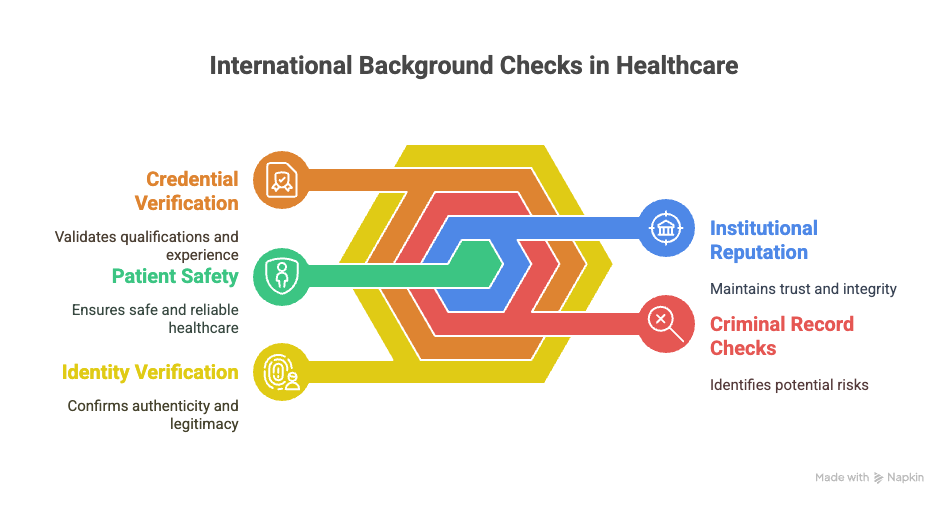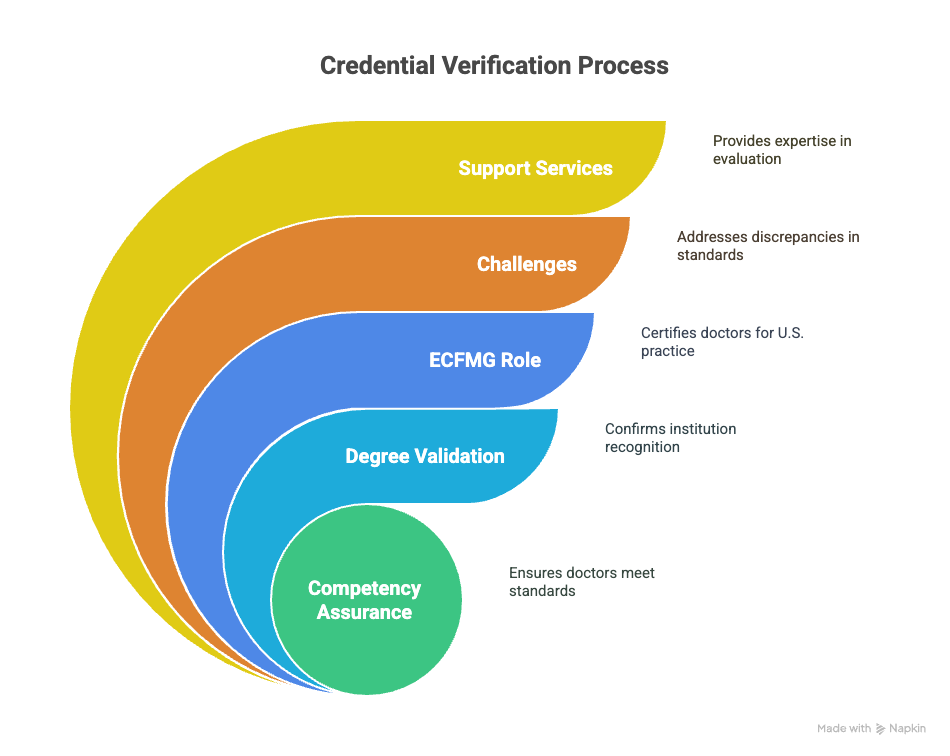Healthcare is one of the most crucial sectors worldwide, and employing competent, qualified personnel is of utmost importance. In this globalized world, healthcare institutions often look beyond their borders, hiring foreign-trained doctors to meet the increasing demand for medical professionals. However, this practice requires rigorous international background checks and credential verifications to ensure that only the most qualified individuals are patient-facing.
This article dives deep into the intricacies of international background checks for foreign-trained doctors, highlighting the vital processes involved, the challenges faced by healthcare institutions, and the best practices to ensure compliance with global healthcare hiring standards.
Key Takeaways
- Healthcare institutions worldwide are increasingly recruiting foreign-trained doctors to meet growing demand and enhance care with diverse expertise.
- International background checks are crucial to verify the qualifications and history of foreign-trained doctors, ensuring they meet patient care and safety standards.
- Credential verification includes confirming medical degrees and certifications, often with help from organizations like the Educational Commission for Foreign Medical Graduates (ECFMG).
- Screening processes such as interviews and simulation exercises assess foreign medical graduates for language proficiency, communication skills, and practical abilities.
- Compliance with international medical licensing requirements and leveraging technology are key to integrating foreign-trained doctors into local healthcare systems.
I have seen gifted candidates miss life-altering prospects, all because of a misunderstanding of the importance of a background check in the hiring process. It is not a matter of filtering; it is the very basis upon which the employer-employee trust hangs. As I assist individuals in applying, I have observed shy individuals gain confidence. The ultimate decision counts, yet being prepared and knowledgeable can make all the difference. In order to construct improved teams, we must shift our mindset. We need to view challenges as excellent opportunities to discover freedom and potential rather than viewing them as constant hard work.
Introduction
Healthcare hiring trends are shifting. Institutions globally are increasingly seeking foreign-trained doctors to address rising demand. The drive towards international recruitment is not just about numbers, but also about acquiring diverse expertise. Engaging doctors from different backgrounds can bring varied perspectives to medical practice, enriching patient care.
Thorough checks of foreign-trained doctors are non-negotiable. Imagine a doctor practicing without verified credentialsâÂÂit's a risk to patient safety and institutional credibility. Meticulous background checks ensure that practitioners meet the high standards expected in healthcare.
This article tackles the complexities of international background checks for these professionals. You'll learn about necessary processes, interesting hurdles faced by healthcare employers, and how to comply with global hiring standards. The goal? Ensuring that only the best, qualified doctors are entrusted with patient care.
Understanding International Background Checks in Healthcare
International background checks in healthcare are comprehensive evaluations used to verify the qualifications and history of foreign-trained doctors. These checks ensure that healthcare professionals meet the necessary standards for patient care and safety. They involve several key components, such as identity and credential verification, as well as criminal record checks.

Identity verification is the first step, confirming the doctor's authenticity and legitimacy. Credential verification follows, which is crucial in the healthcare industry to validate a physician's qualifications. This involves confirming medical degrees, certifications, and professional experience against international standards.
Criminal record checks are equally essential. They aim to identify any past activities that could pose a risk to patients or the institution. A thorough check can uncover legal issues that might have slipped through other screenings.
The importance of these checks resonates throughout the entire sector. They play a pivotal role in maintaining patient safety and upholding institutional reputations. By ensuring that healthcare professionals are properly qualified, healthcare facilities can protect themselves from malpractice and other legal concerns.
Is your current international background check process robust enough to safeguard these critical areas? Consider reinforcing your strategies to safeguard your institution's integrity and patient trust.
Credential Verification for International Physicians
Ensuring the competency of foreign-trained doctors requires a meticulous credential verification process. First, you need to validate medical degrees and certifications. Start by confirming that the institution granting the degree is recognized by the respective country's health or education authority. This foundational step can reveal the legitimacy of the educational background.
The Educational Commission for Foreign Medical Graduates (ECFMG) plays a pivotal role here. They specialize in certifying doctors for practice in the United States. Their process includes checking document authenticity and comparing foreign qualifications to U.S. standards. You might find their services invaluable when assessing credentials from unfamiliar countries.
Challenges often arise during this verification. One common issue is discrepancies in educational standards between nations. For instance, medical training in some countries might not align with U.S. requirements. Documentation can also be inconsistent. A degree might lack detail on curriculum and clinical experience, complicating verifications.

Consider leaning on professional networks or hiring foreign credential evaluation services if your organization faces these challenges. They provide expertise in comparing international qualifications to local standards.
Keeping these practices in mind can help you streamline the process, ensuring only qualified professionals make it through your doors. Curious about the broader background check landscape? Check out Understanding the Employment Background Check Process for more insights.
Foreign Medical Graduate Screening
Screening foreign medical graduates (FMGs) is a critical step for healthcare institutions seeking qualified professionals. This ensures that patients receive care from doctors who meet necessary standards and possess the expected competencies. The process, while rigorous, is essential in maintaining trust and excellence in healthcare.
Document Collection
The first step in screening involves document collection. Graduates are required to provide valid medical degrees, transcripts, and relevant certifications. These documents serve as proof of education and training and must be authenticated to verify their legitimacy. For example, an institution may use the Educational Commission for Foreign Medical Graduates (ECFMG) to confirm credentials. Verification is not just about checking boxesâÂÂitâÂÂs about ensuring these professionals have the foundational knowledge required for safe practice.
Interview Process
Next comes the interview process. Interviews allow institutions to assess language proficiency and communication skillsâÂÂvital components of patient care. They also provide insight into the candidateâÂÂs understanding of local medical practices and ethical standards. A structured interview process can reveal a candidate's critical thinking and adaptability to new environments.
Simulation
Leading healthcare organizations often implement simulation exercises as part of their best practices. These exercises test practical skills and decision-making abilities in a controlled, realistic setting. For instance, a hospital might use patient scenarios to evaluate a doctorâÂÂs response to emergencies or routine consultations.
Peer Reviews
Incorporating peer reviews is another effective practice. Peer reviews involve assessments from established doctors who have undergone similar transitions. This step helps ensure that new candidates not only possess the right credentials but also fit the cultural and professional dimensions of the institution.
Investing in such thorough screening processes might seem taxing, but it safeguards patient safety and institutional integrity. As someone entrenched in this field for decades, I can attest that a meticulous approach to FMG screening will consistently yield healthcare professionals who are both competent and compassionate caretakers.
International Medical Licensing Checks
Licensing is a critical step for international medical graduates (IMGs). It determines whether a doctor can practice legally in a given country. Each country has its own set of requirements. In the U.S., for instance, the U.S. Medical Licensing Examination (USMLE) is essential. Passing all three steps shows competence. ItâÂÂs necessary for state licensing.
Canada requires the Medical Council of Canada Qualifying Examination (MCCQE). The United Kingdom relies on the Professional and Linguistic Assessments Board (PLAB) test. Understanding these diverse requirements is key for IMGs aiming to work abroad.
Country-specific processes can vary widely. In Australia, the Australian Medical Council (AMC) oversees assessments. Doctors often face additional requirements, like supervised practice or bridging programs, depending on the role and location. Such diversity demands careful research by IMGs before applying.
Fortunately, there are resources available. The Educational Commission for Foreign Medical Graduates (ECFMG) assists with certification verification in the U.S. Similarly, the World Directory of Medical Schools can verify if an institution is recognized globally.
Resources help guide IMGs through complex licensing processes. They provide vital information and support. For those venturing into international practice, knowing these tools can greatly simplify the journey.
Screening IMGs (International Medical Graduates)
Screening international medical graduates (IMGs) is a vital component in upholding the integrity of healthcare systems worldwide. You ensure that only qualified professionals deliver patient care. This screening maintains high standards and protects patients' health.
Technology plays a major role in the screening process. Background check software can verify identities, check criminal records, and validate professional credentials swiftly. Tools like these streamline the process, giving you reliable information quickly. The Educational Commission for Foreign Medical Graduates (ECFMG), for instance, is instrumental in assessing whether an IMG's education and training are on par with local requirements.
Consider the case of a prominent U.S. hospital that integrated a group of qualified IMGs from India into its healthcare system. By using rigorous screening protocols, they confirmed each candidate's certifications and experience levels met necessary standards. The process included thorough credential and criminal background checks, illustrative of best practices in IMG screening.
When managed effectively, such integration is beneficial. It brings diverse perspectives and broadens the range of patient care methods. Consistent, careful screening not only enhances your institution's reputation but also reinforces patient trust in healthcare services. Are your screening processes comprehensive enough to maintain these standards?
Challenges in Global Healthcare Hiring Compliance
Navigating the legal landscape is a major hurdle. Each country has its own set of laws and regulations, which can be a minefield for hiring managers. Compliance requires diligence. You must understand each region's privacy laws, labor rules, and medical licensing requirements. This ensures you handle personal data responsibly and hire legally.
Cultural and language barriers also pose significant challenges. Clear communication is crucial, yet differences in culture and language can cause misunderstandings. Misinterpretation of job roles or expectations can arise. Offering language support or cultural training can bridge gaps and foster better integration.
Integrating foreign-trained doctors into local systems is not straightforward. Systems and practices can differ greatly. New hires need orientation and training on local procedures. Healthcare models vary between countries, and transitioning can be difficult without support. Creating tailored programs can ease this, aiding both the doctors and their new colleagues in adjusting to shared practices.
Figuring out how to align international expertise with local needs involves patience and flexibility. Being open to adapting your processes can lead to smoother transitions, ultimately benefiting patient care and team cohesion.
Solutions and Best Practices for International Background Check Healthcare
When it comes to international background checks for healthcare, having standardized procedures can make a real difference. Start by establishing a consistent protocol that applies to all foreign-trained doctors, irrespective of their country of origin. This reduces confusion and ensures a uniform standard of verification that upholds the integrity of your institution.
Partnering with international verification bodies is another practical step. Collaboration with organizations like the Educational Commission for Foreign Medical Graduates (ECFMG) can simplify the verification of medical credentials. These partnerships provide access to reliable networks and resources, which are invaluable for confirming the authenticity of qualifications and experience.
Don't underestimate the value of continuous education and training. Foreign-trained doctors should undergo regular training to ensure they are up to date with local healthcare practices and regulations. This helps in aligning their expertise with the standards expected in their new environments. Encouraging ongoing education not only improves skill levels but also boosts confidence in patient care.
Think about adopting technology that supports these checks. Modern tools can expedite parts of the process, such as identity verification and document assessment. Select software that integrates well with your existing systems and keeps data secure.
Lastly, engage your team in cultural competency training. This can help in understanding the diverse backgrounds of foreign-trained doctors, ensuring smoother cooperation and reducing potential cultural misunderstandings.
These best practices don't just streamline the hiring process; they contribute to a safer and more effective healthcare system. Focusing on these solutions can help maintain high standards and promote a diverse, globally-aware medical workforce.
Conclusion
The thoroughness of international background checks for foreign-trained doctors is more than just a procedural requirement; it's a commitment to patient safety and high-quality healthcare. As we've navigated through the vital processes involved in these checks, it's clear that rigorous verification of credentials, licensing, and background history forms the backbone of trustworthy healthcare systems worldwide.
Trends in global healthcare hiring suggest a continued dependence on foreign expertise. As the demand for diverse medical professionals rises, the role of standardized background checks becomes even more significant. Healthcare institutions must stay ahead by adopting best practices and technology to streamline these processes, ensuring that only competent and qualified individuals provide care.
Ultimately, excellence in healthcare begins with the people who deliver it. By prioritizing meticulous checks, healthcare institutions can confidently forge paths to safer, more effective patient care across borders.
Additional Resources
To deepen your understanding of international background checks and hiring practices, consider exploring the following resources:
- The Department of Labor provides a comprehensive overview of hiring best practices in the United States. It's a valuable tool for understanding legal frameworks that can impact your hiring strategies.
- The Joint Commission offers guidelines and standards for healthcare accreditation, including how foreign-trained doctors can meet those requirements. This can be instrumental in ensuring your hiring processes align with necessary standards.
- The Educational Commission for Foreign Medical Graduates (ECFMG) plays a critical role in credential verification and can provide support on the specifics of verifying international medical qualifications.
- The World Directory of Medical Schools is a useful resource for checking the accreditation status of medical schools worldwide. ItâÂÂs essential for confirming the legitimacy of degrees from foreign-trained doctors.
These tools can help ensure your hiring practices are efficient and compliant with the relevant regulations, supporting a robust approach to international healthcare recruitment.
Frequently Asked Questions (FAQs)
How do you verify a foreign doctor's credentials?
You can verify a foreign doctor's credentials through organizations like the Educational Commission for Foreign Medical Graduates (ECFMG) in the US. They provide certification for eligible international medical graduates. The process involves checking medical diplomas, transcripts, and passing required exams.
Are background checks required for international medical graduates?
Yes, background checks are typically required. These can include verifying education, professional licenses, and work history. Some countries also require you to check criminal records.
What does an international criminal check include for doctors?
An international criminal check for doctors includes verifying any past criminal activities in the countries where the doctor has lived or worked. This might cover offenses like fraud or malpractice, ensuring they meet professional standards.
How long does it take to screen a foreign-trained physician?
Screening can take anywhere from a few weeks to several months. The time frame depends on the complexity of the check and the responsiveness of issuing institutions. Prompt submission of complete documents can speed up the process.
What countries are hardest to verify credentials from?
Countries with complex bureaucracies or less transparent systems can be challenging. Places with ongoing conflicts or limited internet access also pose difficulties. Countries like Syria, Somalia, and North Korea often face these challenges.
What documents do you need to conduct a verification?
You need original or certified copies of medical diplomas, transcripts, and license verifications. Supporting identification documents and a detailed resume may also be required.
Do language barriers affect the verification process?
Yes, language barriers can slow down the process. Documents not in the native language of the verifying body often require certified translations, adding steps to the process.
Is there a fee for credential verification?
There is often a fee for credential verification. The cost covers administration and processing and can vary by country and the organizations involved.
How can you prepare for a smooth verification process?
Prepare by gathering all necessary documents, and ensure they are accurate and up to date. Respond promptly to requests for information and follow up regularly on your applicationâÂÂs progress.
Definitions
Credential Verification
This is the process of confirming the legitimacy of a healthcare professionalâÂÂs academic qualifications and certifications. You check whether the medical school is officially recognized, then review documents like degrees and transcripts to make sure they meet your countryâÂÂs standards. For example, U.S. employers often rely on the Educational Commission for Foreign Medical Graduates (ECFMG) to perform this task. It helps you avoid hiring someone with unverified or fraudulent credentials.
International Background Check
An international background check evaluates a candidateâÂÂs personal, professional, and legal history across countries. You verify identity, criminal records, education, and work history. These checks are especially useful when hiring foreign-trained doctors. They help you reduce risk and confirm that a candidate meets your healthcare facilityâÂÂs safety and compliance expectations.
Licensing
Licensing confirms that a doctor is legally permitted to practice medicine in a specific country or state. Requirements vary by region. For example, physicians must pass the USMLE in the U.S. or the PLAB in the U.K. Before hiring, you need to confirm that a candidate holds a valid license from the appropriate medical authority. This protects your institution and ensures legal practice.
Screening
Screening is the step-by-step process of reviewing a candidateâÂÂs qualifications, experience, and background before making a hiring decision. For foreign-trained doctors, this can involve checking documents, conducting interviews, and running simulations. It helps you filter out unqualified applicants and bring in those who are ready to take on clinical responsibilities safely.
Cultural Competency Training
Cultural competency training helps staff work effectively with people from different backgrounds. It includes learning about communication styles, healthcare beliefs, and cultural norms. You can use these sessions to support foreign-trained doctors and reduce misunderstandings at your facility. A culturally aware team builds stronger relationships with patients and coworkers alike.
References
- Health Carousel â International Staffing Challenges and Solutions
- TrueProfile â 5 International Recruitment Challenges in Healthcare
- PatientCalls â Medical Field Recruitment Challenges & How to Solve Them

GCheck Editorial Team
Meet the GCheck Editorial Team, your trusted source for insightful and up-to-date information in the world of employment background checks. Committed to delivering the latest trends, best practices, and industry insights, our team is dedicated to keeping you informed.
With a passion for ensuring accuracy, compliance, and efficiency in background screening, we are your go-to experts in the field. Stay tuned for our comprehensive articles, guides, and analysis, designed to empower businesses and individuals with the knowledge they need to make informed decisions.
At GCheck, we're here to guide you through the complexities of background checks, every step of the way.






